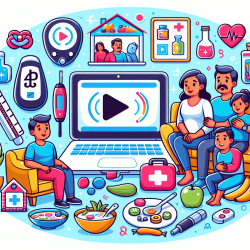Introduction
The rapid evolution of telehealth has revolutionized the way clinical psychology services are delivered, especially in the wake of the COVID-19 pandemic. As practitioners, it is imperative to adapt to these changes and enhance our skills to meet the growing demands of telehealth services. A recent study titled "Educating for the Future: a Preliminary Investigation of Doctoral-Level Clinical Psychology Training Program’s Implementation of Telehealth Education" sheds light on the current state of telehealth education in doctoral programs and offers valuable insights for practitioners seeking to improve their telehealth competencies.
The Importance of Telehealth Education
Telehealth education is crucial for preparing future clinicians to deliver effective and ethical care in a digital world. The study found that prior to COVID-19, only 21.4% of doctoral programs included telehealth-focused education. However, post-pandemic, this number surged to 92.9%, with many programs making it a mandatory part of the curriculum. This shift underscores the increasing recognition of telehealth as an essential component of clinical training.
Implementing Telehealth Education
For practitioners looking to enhance their telehealth skills, the study suggests several strategies:
- Integrate foundational telehealth knowledge into core education, such as ethics, assessment, and intervention classes.
- Develop specialized telehealth-focused coursework for advanced students, incorporating both didactic instruction and hands-on practice.
- Offer real-world practicum experiences with varying levels of complexity and support.
- Evaluate training components to assess their impact on student outcomes and attitudes towards telehealth.
Ongoing Need for Telehealth Education
Despite the progress made, there remains a significant need for comprehensive telehealth education. The study highlights that even with increased telehealth training, many programs still desire additional education for their students. This ongoing need presents an opportunity for practitioners to advocate for more robust telehealth training in their institutions and to seek out continuing education opportunities.
Encouraging Further Research
As telehealth continues to evolve, further research is needed to optimize telehealth education. Practitioners are encouraged to participate in studies, contribute to the development of telehealth curricula, and share their experiences to help shape the future of telehealth training. By doing so, we can ensure that our profession remains at the forefront of delivering high-quality, evidence-based care to diverse populations.
Conclusion
The integration of telehealth education into clinical psychology training programs is a critical step towards preparing practitioners for the future. By embracing these educational advancements, we can enhance our skills, improve patient outcomes, and contribute to the ongoing evolution of telehealth services. To read the original research paper, please follow this link: Educating for the Future: a Preliminary Investigation of Doctoral-Level Clinical Psychology Training Program’s Implementation of Telehealth Education.










